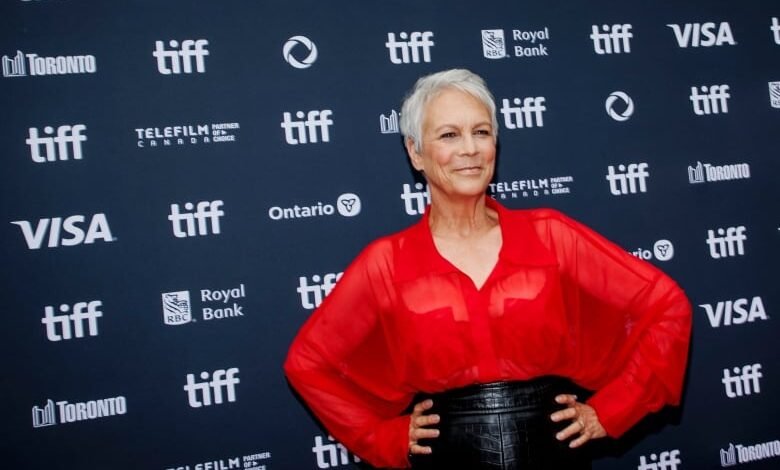Feral mothers, aging showgirls and extreme beauty ruled at TIFF. But for women over 40, roles dry up | CBC News

[ad_1]
Society’s treatment of women as they age has emerged as a major theme at this year’s Toronto International Film Festival (TIFF), including a horror about an age-reversing beauty treatment and a dark comedy about a new mother who turns into a feral dog.
But even as these films bring up age-old conversations about women in Hollywood, the numbers show women over 40 are still being left behind in big-budget films that do well at the box office.
Amy Adams, who stars in Nightbitch, says she’s happy these conversations are happening at TIFF.
“I feel like we’ve been building to it, and I hope that momentum continues,” she told CBC’s Eli Glasner. “I’m grateful my daughter gets to be here and gets to hear these stories of women. It’s really important to me.”
Nightbitch is a horror-comedy about an artist who pauses her career to be a stay-at-home mom, and whose life takes a surreal turn when she starts transforming into a dog.
Jamie Lee Curtis, who stars alongside Pamela Anderson in The Last Showgirl, a film about a performer who has to plan her future after her show’s 30-year run abruptly ends, is also glad to see films bringing women’s issues to the forefront.
“I’m happy that we’re talking about it as a cultural confusion — that this cosmeceutical industrial complex, which is feeding all of us every day through advertising that we are not enough, is being explored in all these different art forms,” Curtis told CBC.

Films reflect underserved demographic: Demi Moore
In The Substance, Demi Moore plays the host of an aerobics show who is fired on her 50th birthday, before a laboratory offers her a substance that promises to transform her into a younger version of herself.
Shell, another film with a coincidentally similar plot, is a dark comedy about an actress played by Elisabeth Moss who is losing roles because of her age — until she undertakes a questionable youth revitalizing treatment from a beauty product CEO played by Kate Hudson.
Several movies at this year’s Toronto International Film Festival explore themes around women’s bodies and aging, including The Last Showgirl, Nightbitch and The Substance. Nightbitch star Amy Adams says she’s happy these conversations are happening and she hopes the ‘momentum continues.’
“I feel like there has been a wake up to a demographic that is deserving of being served,” Moore told The Associated Press. “I think you’re starting to see a lot more stories that are reflecting that audience, and it’s nice.”
Moore, 61, says The Substance will please horror fans but is also for anyone interested in a unique way of delving into the subjects of aging and the pursuit of perfection.
“It’s really about accepting yourself as you are,” she said.

Movies highlight lack of progress in industry
Toronto-based film critic Rachel Ho says she found The Substance and its portrayals of the ways a body changes with age particularly impactful.
She notes these discussions feel especially topical in an era when a generation of actors who “were kind of ‘it’ people” in the 80s and 90s are taking roles that look back on their beauty and aging in a different way.
“If you think of all the filters being used, plastic surgery, AI, all those kind of discussions, it kind of makes sense that that is something that’s top of mind,” she said. “Not just aging, but kind of the fading of beauty, I suppose, as we age.”
While Ho says it’s valuable to make films that get people talking about women and aging, she says those conversations haven’t seemed to move the needle in the last two decades, and the fact that these movies are still topical highlights that lack of progress.
“It doesn’t matter how much more progressive or aware we become of this pattern as a society, it seems like it’s still happening,” Ho said.
“We’re still seeing when men get older, they’re still getting paired up with the new 20-somethings, and then we’re supposed to believe that they’re a couple somehow.”
Roles for women drop sharply after 40: study
An annual study led by Martha Lauzen at San Diego State University found the percentage of movies with female protagonists dropped from 33 per cent to 28 per cent from 2022 to 2023. Meanwhile, the percentage of female characters dropped dramatically as they moved into their 40s, with one third of female characters in their 30s, and only 15 per cent in their 40s. Male characters, by comparison, held steady at 28 per cent in both age groups.
The study has monitored portrayals of girls and women in the top 100 domestic grossing films since 2002, and has consistently found over the years that female characters are much younger than male characters.
A 2015 study using Internet Movie Database data on American films from 1920 to 2011 found this pattern has held steady for decades, with women only getting 20 per cent of leading roles past age 40.
Melissa Silverstein, the founder of the Women and Hollywood blog and an advocate for gender diversity and inclusion in film, says it’s great to see films like The Last Showgirl, Nightbitch and The Substance that are actually directed by women, and she notably appreciated Nightbitch for “normalizing” motherhood and navigating conversations about the lead character having to compromise her work.

“What is great to see is women putting forward these kinds of issues, versus in the past, it’s been a lot of men,” she said. “I feel really heartened that women are able to tell the stories now.”
But while she finds this batch of films at TIFF encouraging, Silverstein says Hollywood needs more women storytellers and people to fund them. And she notes that there’s a particular need for more stories about women of colour, as the films on this theme at TIFF this year predominantly feature white women.
Silverstein says it’s time for Hollywood to stop treating stories focused on women as niche.
“We are not special, we don’t need to be in the specialized corner. We’re half the population,” she said. “It seems that we still have a problem mainstreaming women’s content.”





